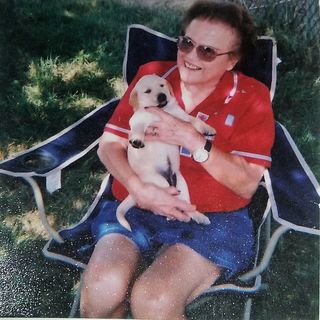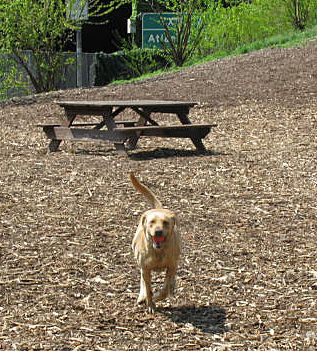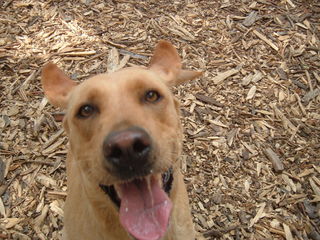I feel her breath as I work. She is asleep in her big gray bed, her mustard-colored head resting on the bolster. She loves her bed and no longer sleeps with me, which I mourn, but she loves that I’m with her here, in her space, for so much of the day. Her breath is the calming metronome of my work.
She loves it even more when I stand up from my desk. Her immediate thought is walk. Mine is more likely pee or coffee or getting dressed.
When I change out of my pajamas, her immediate thought is also walk.
***
It’s been four months and one week since my brother and I watched her refuse a brownie before the veterinarian slid a needle into her leg and she slumped against Jim, scared that her once highly honed muscles were now gone. She slid to the floor, asleep.
We couldn’t stay for the final injection.
***
When death comes in my family, it has become a tradition to drink a shot of Bushmills, and when we get back to my apartment, we get out the bottle and shot glasses and toast fifteen years of the strongest love I’ve ever known. Then Jim carries her bed to the trash.
I can’t do that, I tell him. I just can’t throw her bed out. Help me.
***
The other day I took Moose, an improbable Chihuahua-Doberman Pinscher cross, with me to the post office. I babysit him a couple of days a week and have watched him, a few weeks off the streets of L.A., turn from an animal into a dog. He hates being left alone and his owners and I have discovered he’s quite content in the car. Maybe because he knows where his humans have gone, he doesn’t howl or go to work on the upholstery. In motion, he likes to be in the back seat with his paws on the middle section of the front.
“It’s like God is my co-pilot,” I laughed with his owner last night. “Cats, squirrels – “
“He’s got them covered,” she fills in. We love Moose, who has about a hundred nicknames.
***
Five months earlier I had been fired from the literary agency I had stupidly joined because the pay was better than my old company. My first book was coming out in six months and I wouldn’t have to find a job for a while. My immediate thought was dog.
My mother raised Labradors when I was little and I grew up with all the goofy comradery of Labs, and the love that shone in their dark eyes. So she watched the papers for litters and when I came out to Montana for the summer, we drove off to Whitefish to inspect the first notice she clipped.
“They’re all good looking pups,” she said of the scrum of yellow and black panting under the tree. “There’s not much you can tell at four weeks.” But oh, how she gloried in sitting in the yard with puppies being passed to her. They were all a little tired from playing in the wading pool. She weighed the temperaments of the two yellow girls who were unspoken for.
“Get this one,” she said, lifting a peasant loaf with a burnt-black belly. “She’s the calmest.”

We laughed about that for the rest of Daisy’s life. If she was the calm one, what was her sister like?
This was a litter that was a match between two good, AKC-registered huntin’ Labs. Daisy’s dew claws were already clipped. I wanted a yellow Lab because my apartment in Brooklyn was dark and I wanted to see everything she was scheming in that little mustard head. I gave my grandniece the choice of two names
Turnipseed,—Lucy or Daisy—and she solemnly chose Daisy. Her AKC name was Princess Daisy of Flathead Lake.
She’d had inoculations the day before we picked her up and she was content to sleep in her cat-carrier in the shade of a family gathering. That night, I placed a towel I’d rubbed her mom down with on my bed and lifted her up to sleep its breath of home. The next morning I held her in my arms as I peed before I could get her outside to do her own business.
She was, I realized, my very own wild animal, a sweet looking wolf. Mother had done the work of civilizing all our dogs and now it was my task. I didn’t have a clue. She was vicious, especially toward my mother. When we went up to my parent’s house, I had to spray my mother’s legs with Bitter Apple to keep Daisy from chewing her thinning skin. We learned quickly not to look her in the eye, which she took as a challenge to attack. She chewed the carpet and merely looked at my scolding mother as if to stay, “Are you done? I have work to do.” She threw tantrums. She refused to be potty trained. Nothing at Flathead Lake—fields of bear scat to explore, our gated orchard where we played hide-and-go-seek, the water— tired her out. She never learned to wrestle, to my brother’s great disappointment, because she was a fighting machine and took no prisoners. I was a giant chew toy and when I went back to Brooklyn my arms looked like I was a junkie. She was too dangerous to play with.
She had no regard for me whatsoever, although when my brother stopped to spend the night, I found her sitting outside his bedroom, waiting for him to get up. She rather liked my father…for five minutes.
The bonding crisis came when I took her to a potluck. The hostess wanted to show me a room she’d redecorated and I left Daisy with my parents. She bolted and went after everyone in the room. One of the guests picked her up and threw her out of the house.
She was eight weeks old. She didn’t really know her name yet. The house was set in the woods, the lake 300 feet away. I was furious. She could wander up to the highway and be killed. She could wander through the woods and be lost. I knew she was violent but she was a baby. You don’t throw a baby, even a vampire baby, out into the dusky woods.
I found her down on the beach and carried her up the hill to our house. Then I sat down in an Adirondack chair and cried: I hated that son-of-a-bitch. I hated my puppy sometimes, but she was mine, for better or worse. For once, my feral roommate laid down at my feet and watched me sob out my anger.
As we crammed the protesting dervish into her crate for our flight back to New York, my brother said, “You know, you don’t have to keep her. Not every dog is right for everybody.” I looked at him in wonder. I’d spent six harrowing weeks with her but when I got her, I’d given my life to her. I would never forgive myself for snatching that back.
The turning point came when we got back to Brooklyn Heights and we went to the big dog run. There were lots of puppies to play with and lots of older dogs who let her know if the nicest way possible that some things were not permissible.
I made friends with the six a.m. crowd. We walked to the run every morning as the Jehovah’s Witnesses, in their polyester clothes and perfect hair, hugging their partner for dear life, hurried to morning prayer. One of Daisy’s first friends was a Japanese Jehovah’s Witness couple who fell in love with this nervy puppy. Where my life had lacked a certain purpose after being fired, now I needed to wear her out, which she did by playing in the dog run as I made friends with the other humans.
Within days, she was house trained and had stopped biting me. She chewed a few books, which I took as a sign that I should finally read them. I now know Jane Austen’s life and the argument that Virginia Woolf was schizophrenic (I don’t agree).
As fall brought rain and cold, I started having other dogs over for playdates. They loved my small dark studio apartment. I think it felt like a den. She had a ton of friends—Boomer, Mally, Stanley, Hero, Henry, Winston, Tiger, Maggie, Gracie, Godiva. They snoozed or they fought, jousting as finely calibrated as a Balanchine ballet.

Some of those owners are my best friends. Even the obstreperous Jack, who couldn’t be trusted around other dogs, got excited when I let her leash go and she rushed up to him. I had to explain to his owner’s boyfriend that this was one dog Jack loved.
She had her enemies, too. All I had to do was whisper, “Where’s Jezebel?” and she started barking.
That winter, on a freezing Sunday morning as we waited for friends to pick us up to go to Prospect Park, I picked up a tennis ball and threw it. Her life’s meaning had begun. She ran after it, picked up the prize and then dropped it, waiting for me to come throw it again. “Bring it,” I said and somehow she knew exactly what I meant. She never failed to bring a ball back to me and if she, rarely, lost the ball in the underbrush, I called “warrrrmer,” “hot-hot!” or “co-o-ld” as she circled, determined to find the ball. These calls wouldn’t work for field trials, but they worked in the dog run.

And then there was a morning when I was talking to someone and Daisy sat down on my feet and waited.
Little by little, she was acknowledging the responsibility she’d taken on with me.
***
The day after she crossed the rainbow bridge (ugh: but what do you say?), without really thinking, I said out loud to myself, “She made me a better person.”
I had to walk her, amuse her, feed her, socialize her. It got me out of the house. I made new friends. I formed a bond.
I also had the uncanny feeling for a couple of weeks after she died that she was lost and looking for me, not understanding what had happened to Us. I would mutter to the sky, “It’s OK, baby girl. Boomer’s there, and Mally. Maybe Grandma and Grandpa are there. Maybe I will be.” I was caught in my atheist-Catholic conundrum, wanting so badly to reassure her.
If I said the words, “You be a good girl. I’ll be back,” she would bark and jump on me to pin me down. She hated being truly separated from me and although she always stayed with people who knew and loved her when I went out of town, it took her time to adjust, leave the door, eat. And when I came home, she’d give me a moment’s look of “Who are you?” that passed into disbelief and then a leap into my arms and lap.
She taught me to show love by showing up. Gifts weren’t important. She just wanted to be with me. My mother had said about Labs that the females want to know where you are and then they’re content to find their spot, while the males want to be at your feet at all times.
Daisy also taught me about disliking people. Love me, love my dog. If you don’t, we’re out of here. Sometimes we were out of there with some choice words on my part.
She was neurotically protective of me. It started with a crack addict who lived in one of the last derelict buildings in the Heights. The day she saw him straddling his bike and peeing, she began to sense when people were Wrong. One night on the Promenade, some crazy guy started charging people with a broom. Thank God, he didn’t get to us. Either he would have been down on his back or she would have been severely injured. To my shame, she came to dislike old people, alcoholics, black men, drug addicts, anyone on crutches, the mentally challenged, neurotics. She could smell a compulsive hand-washer from blocks away. My friend Nan would turn to me and whisper, “Definitely needs Prozac” when the hunched-over worry wart passed and she could get a good look at Daisy's object. The Prozac was for the person, not Daisy.
It was the service dog in her that was so prejudiced, a perverted version of it. She needed to be able to read people’s faces. It didn’t help that many of the people on the street were frightened of “big” dogs (they hadn’t met our friend Jock, a Neapolitan mastiff). I never did stop yanking her from the door when we moved back to Montana. I’d apologize profusely while the UPS guy squatted to love her. The day he showed up with a package and a cookie after her death was one of the hardest moments.
She had my back. If she heard me stumble, she would turn around to see if I was OK. When we hiked, she was all over the place—until I had to go downhill, which scares me. Then she was two steps behind me. And above all, she firmly believed that I could not swim. I came home with scratches and bruises from swimming with her.
It’s been years since anyone needed to take care of me.
In large groups, Daisy would find her way into my lap: 75 pounds of needing to connect and to protect.
I learned what nearly unconditional love was from Daisy (everyone says dogs offer unconditional love. Not true. Their love is highly conditional but it’s but on a narrow continuum: food, treats, walks, attention. What is unconditional is our love for them.) I learned that kind of wholehearted love is hard work but is completely worth it at night.
I had to stand up for Daisy. She barked incessantly in the dog run: throw-the-ball, throw-the-ball, throw-the-ball.

People got upset about the noise (the dog run was over the BQE, so it was drowned out by traffic white noise to the neighbors) and there were petty factions who hated her for this—while their dogs were jumping on picnic tables and going through people’s bags. I had confrontations. And Daisy never fought for her ball when it was stolen. She trotted around after the thief, waiting for it to get bored and drop it. I used to tell people that fighting for the ball would be tearing the duck. She was a huntin’ dog. Huntin’ dogs don’t play tug-of-war over ducks. Donald Trump could profit from an hour watching a couple of eager Labradors playing fetch.
And then she taught me the hardest lesson: saying goodbye. We had a vicious fire season last summer and what started as reverse sneezing quickly descended into breathing problems we figured were nasal tumors. The summer before she’d had a series of bladder infections and a bout of vestibular she didn’t quite recover from. Now she had to hold her head up to breathe. It was my responsibility—and mine alone—to make the decision. I had to think about it (and her and me) for a few days but one afternoon I laid down by her bed to pet her ears and murmur sweet everythings to her, and she got up and walked out to the living room couch.
She was too sick, too tired from fighting, to really care about me. It was her last lesson and I made the decision then. She loved me, but she was too miserable for love.
***
I have grieved the deaths of my parents, and grieved hard. They taught me the big things like changing my underwear, setting the table, and brushing my teeth, but it was Daisy who taught me the finesse of daily love and letting go.
She is not behind me in her bed. Montana is in the middle of a severe storm warning: it will be one degree tonight with strong winds. I’m grateful I neither have to walk her nor put her through that.
But I’m still mourning, still expecting her to be behind me or out in the living room.
The loss of a dog is the most intimate grief.




